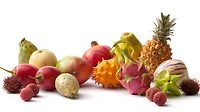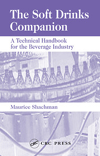Tropical fruits add a taste of the exotic
Tropical fruits add variety to beverage applications

Zico’s Tropical coconut water features pineapple, guava and passion fruit flavors, bringing mainstream tropical flavors to consumers. (Image courtesy of Zico)

Tropical fruits have the ability to add exotic notes to beverages while still bringing familiarity to consumers, Northwest Naturals’ Erin Gipe says. (Image courtesy of Tree Top Inc.)


Although summer has come to a close, some consumers might want to grab ahold of the last drops of the season by indulging in the exotic, tropical flavors of the warmer climates. While flavors like pineapple, mango, passion fruit, coconut and lemon, among others, offer consumers a tropical escape, they also offer some nutritional benefits for their bodies.
“Bananas are said to be capable of making you feel ‘happy’ due to the high amounts of vitamin B6,” says Philip Barone, director of flavor development for California Custom Fruits and Flavors Inc. (CCFF), Irwindale, Calif. They also offer potassium, which can help regulate electrolytes, especially after a workout, he adds.
Other tropical fruits also are known for their high levels of vitamins, says Chris Schubert, vice president of sales for Encore Fruit Marketing Inc., San Dimas, Calif. For example, mangoes are rich in vitamin A; pineapple, passion fruit and acerola are known for their high levels of vitamin C; and guava offers high levels of vitamins A and C as well as fiber, folate, potassium, copper, manganese and many other minerals, he explains.
Beyond benefits that align with consumers’ nutritional interests, tropical fruits offer taste profiles that align with their flavor interests as well, according to experts.
“Most consumers drink what they know,” Encore’s Schubert says. “Therefore, tropical fruits in beverages are very popular with Hispanics as well as East and South Asian consumers. However, some tropical fruit beverages that utilize common tropicals, such as banana, mango, coconut and pineapple, which have become ‘mainstream’ flavors, are now popular with most consumer groups.”
In some cases, tropical fruits are the second most popular flavor profile, trailing only berry flavors in popularity, says Erin Gipe, product development manager for Northwest Naturals, a wholly owned subsidiary of Tree Top Inc., Selah, Wash. These fruits can add exotic notes to beverages while still being familiar to consumers, she explains.
On the flipside, tropical flavors can offer adventurous consumers a taste of something a little different. Millennials, in particular, like to experiment with diverse flavors from around the world and increasingly seek exotic foods when grocery shopping, according to Fona International, Geneva, Ill.
Adding tropical flavors into blends with other flavors can make a beverage’s flavor profile more exciting, says Gert van Manen, president of iTi Tropicals Inc., Lawrenceville, N.J. “I think people are a bit bored with just apple juice and sodas and orange juice,” he says. “I mean, how much more fun is it to drink an orange-mango [beverage] than just orange?”
Tropical trends
When iTi Tropicals started offering tropical fruits in 1988, consumers were generally unfamiliar with this flavor category, van Manen says. Twenty-five years later, his business has grown ten-fold as more and more consumers take an interest in these exotic tastes, he says.
Encore’s Schubert also says he has noticed the growing popularity of tropical flavors in new beverage introductions. “Almost every major beverage company has tropical blends in their line, and they are updated all the time,” he says.
According to Beverage Industry’s New Product Development Survey, published in January, 29 percent of respondents used tropical fruits in their new beverage products in 2012, which represents a 1 percent increase from the previous year.
According to Chicago-based Mintel’s Global New Products Database, more than 600 beverage products containing tropical flavors have launched in the U.S. market since August 2012. While some of the latest products, such as El Segundo, Calif.-based Zico’s Tropical coconut water variety featuring pineapple, guava and passion fruit flavors, offer more mainstream tropical tastes, others, like Secaucus, N.J.-based Goya Foods Inc.’s Soursop Nectar, which also features guanabanana flavor, give U.S. consumers a taste of something more exotic.
However, in terms of use in products, beverage-makers tend to stick to the more mainstream tropical fruit flavors, according to the New Product Development Survey. Tropical fruit flavors used in 2012 include mango, pomegranate, acai, pineapple, coconut, passion fruit, banana and kiwi. Sales also indicated an interest in mainstream tropical fruit flavors, according to the survey. Acai and pomegranate tied with apple for second place on the list of top-selling flavors of 2012.
CCFF’s Barone also notes that the South American mango flavor profile also tops the popularity charts, especially in the drinkable yogurt category, followed by pineapple and guava.
Going coconuts
Despite the continued strength and popularity in the tropical fruits market, iTi’s van Manen notes that the industry has had to compensate for negative publicity surrounding the sugar and calorie content of fruit juices. Coconut water can be a solution to this, he says. “If we look at coconut water, … the benefit is that the overall calories will come down while maintaining a 100 percent fruit juice claim,” he explains. It’s also a natural isotonic and can be a 100 percent fruit juice-based alternative to sports drinks, he adds.
Coconut water has been lauded by analysts as a bright spot in the beverage industry with the launches of new products containing it quintupling in the last five years, according to market research firm Mintel, Chicago.
Products containing coconut water also can add functional claims to their labels. Low/no/reduced fat is the most popular of these claims, accounting for 47 percent of all coconut water claims in 2012, followed by low/no/reduced allergen and gluten-free each at 43 percent, and natural at 40 percent, according to Mintel.
Within a beverage application, coconut water blends well with most fruit juices, particularly on a 50-50 basis, according to iTi’s van Manen.
Versatile variations
Like coconut water, many other tropical fruits offer formulation benefits. Overall, tropical fruits are versatile and blend easily into beverages, according to experts.
Tropical fruits in puree form are, in general, suitable for smoothie-type applications and nectar drinks because their flavors blend well and the natural mouthfeel from the fruit solids allows for fewer additives, adds a creamy texture, and helps support the flavors, Northwest Naturals’ Gipe explains. Bananas, in particular, are commonly used in smoothies because of the viscous mouthfeel they add to the beverages, iTi’s van Manen adds.
The light flavor and color of clarified versions of tropical juices make them suitable for flavoring teas and coconut waters, say Research Chef Steve Corson and Product Developer Katie Boyle for Northwest Naturals. “These clarified versions of tropical juices are very mild and work well as a base for any kind of fruit juice blend,” Boyle adds. In addition, clarified juices are helpful when sediment or clouding is a formulation concern, Gipe says.
Encore’s Schubert says he has noticed a growing demand for clarified tropical juices for flavored water, soft drink and alcohol beverage applications as well, thus expanding the use of tropical juices throughout the beverage market.
Related: 2012 New Product Development Survey
Looking for a reprint of this article?
From high-res PDFs to custom plaques, order your copy today!









